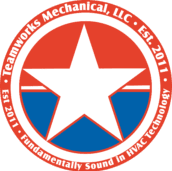Types of Boilers: Firetube, Watertube, Electric & Condensing Boilers
Boilers are an integral part of modern-day heating systems, enabling us to enjoy cozy warmth during colder months and ensuring hot water supply for various applications. These ingenious devices come in different shapes and sizes, each designed to meet specific heating needs efficiently.
Types of Boilers for Home Heating
In this blog post, Teamworks Mechanical will explore the four main types of boilers: Firetube, Watertube, Electric, and Condensing boilers, highlighting their working principles, advantages, and applications.
Firetube Boilers
Firetube boilers are one of the oldest and most commonly used boiler types. They are aptly named due to their design, which consists of a shell containing water and combustion gases flowing through tubes within it. The heat from the burning fuel transfers to the water, producing steam.
These boilers are relatively simple in construction, making them cost-effective and less likely to require boiler repair. Firetube boilers find widespread use in industrial settings, such as refineries, pulp and paper plants, and commercial buildings, where high steam production rates are required.
Advantages of Firetube Boilers
- Robust construction and proven reliability.
- Easy to clean and repair due to the straight-forward tube arrangement.
- Ideal for constant, heavy-load applications.
Watertube Boilers
Watertube boilers, in contrast to Firetube boilers, have water-filled tubes that circulate through a furnace. The heat from the furnace causes the water to boil, generating steam. These boilers offer higher efficiency, quicker steam production, and can handle higher pressure and temperature. Due to these advantages, Watertube boilers are commonly used in power generation plants, large industrial facilities, and applications demanding high-pressure steam.
Advantages of Watertube Boilers
- Faster steam production and response to changing loads.
- Ability to withstand high-pressure and high-temperature conditions.
- Suited for large-scale applications and power generation.
Electric Boilers
Electric boilers are a modern innovation, utilizing electricity as their primary source of heat. Homeowners often choose between an electric boiler vs furnace. They are compact, quiet, and do not produce any emissions, making them environmentally friendly. Electric boilers are ideal for areas where natural gas supply is limited or for users who prioritize energy efficiency. They are commonly used in residential buildings, hospitals, and small commercial spaces.
Advantages of Electric Boilers
- Zero emissions, promoting a cleaner environment.
- Compact and easy to install, saving valuable space.
- High energy efficiency, reducing operating costs.
Condensing Boilers
Condensing boilers are designed to extract additional heat from the flue gases that would typically be lost in conventional boilers. They achieve this by condensing the water vapor in the exhaust gases, releasing latent heat and increasing overall efficiency. Condensing boilers are available in both Firetube and Watertube configurations and are known for their high energy efficiency, making them a popular choice for residential and commercial heating applications.
Advantages of Condensing Boilers
- Remarkable energy efficiency, reducing fuel consumption and operating costs.
- Lower greenhouse gas emissions, contributing to environmental sustainability.
- Ideal for retrofitting older heating systems to enhance efficiency.
In conclusion, the world of boilers is diverse, catering to various heating needs across different sectors. Whether it's the time-tested Firetube and Watertube boilers for heavy-duty industrial applications, the eco-friendly and energy-efficient Electric boilers for residential use, or the forward-thinking Condensing boilers for enhanced efficiency, there's a boiler type suitable for every situation.
When choosing a boiler, it's essential to consider factors such as energy efficiency, operational requirements, and environmental impact. Consulting with heating experts and professionals will help you make an informed decision and ensure your heating system meets your specific needs while keeping you warm and comfortable all year round.




















